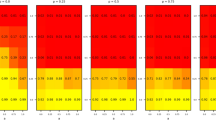Abstract
As a common social management problem in urban development, urban garbage classification often presents a “tragedy of the commons” situation because of its strong external resistance. The methods used include the comparative study of different management organization types, based on the hierarchical organization minimum authorized theory and repeated games theory. Results show urban garbage classification is extremely complex, which inevitably lead to ineffective, if took simple hierarchical organizational model. Faced with the failure of hierarchical organizations, there are two solutions: we’d better rely on market forces with reducing supervision costs at the external constraints level, and network organization based on repeated games may be a good choice at the internal mechanism level.
Similar content being viewed by others
References
Axelrod R, Hamilton WD (1981) The evolution of cooperation. Science 211(4489):1390–1396
Bendor JB (1985) Parallel systems: Redundancy in government. University of California Press, Berkeley and Los Angeles, pp 46–48
Chen F, Nie Y (2010) A governance model under cyclic economic conditions MSW. Spec Zone Econ 2:303–304
Chen H, Hu Y, Liu F et al (2011) Some thoughts on environmental education in education for all on the separate collection of municipal solid waste. China Popul Resour Environ (S1):75–78
Chen S, Li R, Ma Y (2015) Paradox between willingness and behavior: classification mechanism of urban residents on household waste. China Popul Resour Environ 25(9):168–176
Gibbard A (1973) Manipulation of voting programs: a general result. Econometrica J Econometric Soc 587–601
Grossman SJ, Hart OD (1986) The costs and benefits of ownership: a theory of vertical and lateral integration. J Polit Econ 94:691–719
Han H, Zhang Z, Peng W (2016) An analysis of the influence mechanism of social capital on households’ waste separation. J Zhejiang Univ (Humanities and Social Sciences) 03:164–179
Hayek FA (1948) Individualism and economic order. University of Chicago Press, Chicago, pp 77–84
Jensen MC, Meckling WH (1976) Theory of the firm: managerial behavior, agency costs and ownership structure. J Financ Econ 3(4):305–360
Lv W, Du J (2016) Japan’s waste classification management experience and its inspiration to China. J Central China Normal Univ (Humanities and Social Sciences) 01:39–53
Min QW, Pei XF, Yu WD (2002) Status, problems and countermeasures of municipal solid wastes and their treatment in China. Urban Environ Urban Ecol 15(6):51
Olson M (2009) The logic of collective action. Harvard University Press, pp 6–32
Ostrom E (2014) Collective action and the evolution of social norms. J Nat Resour Policy Res 6(4):235–252
Satterthwaite MA (1975) Strategy-proofness and arrow’s conditions: existence and correspondence theorems for voting procedures and social welfare functions. J Econ Theory 10(2):187–217
Sen A (1983) Liberty and social choice. J Philos 80(1):5–28
Zhang Y, Shang X, Li K et al (2011) Technologies status and management strategies of municipal solid waste disposal in China. Ecol Environ Sci 20(2):389–396
Acknowledgements
The authors appreciate the financial support by the National Natural Science Foundation of China (Grant No. 71373231), and the helpful work from the organizing committee of CRIOCM2016 International Symposium on Advancement of Construction Management and Real Estate.
Author information
Authors and Affiliations
Corresponding author
Editor information
Editors and Affiliations
Rights and permissions
Copyright information
© 2018 Springer Nature Singapore Pte Ltd.
About this paper
Cite this paper
Su, T., Wu, Y. (2018). On the Garbage Classification Mechanism Based on Repeated Games in Urban Network Organization. In: Chau, K., Chan, I., Lu, W., Webster, C. (eds) Proceedings of the 21st International Symposium on Advancement of Construction Management and Real Estate. Springer, Singapore. https://doi.org/10.1007/978-981-10-6190-5_94
Download citation
DOI: https://doi.org/10.1007/978-981-10-6190-5_94
Published:
Publisher Name: Springer, Singapore
Print ISBN: 978-981-10-6189-9
Online ISBN: 978-981-10-6190-5
eBook Packages: Business and ManagementBusiness and Management (R0)




